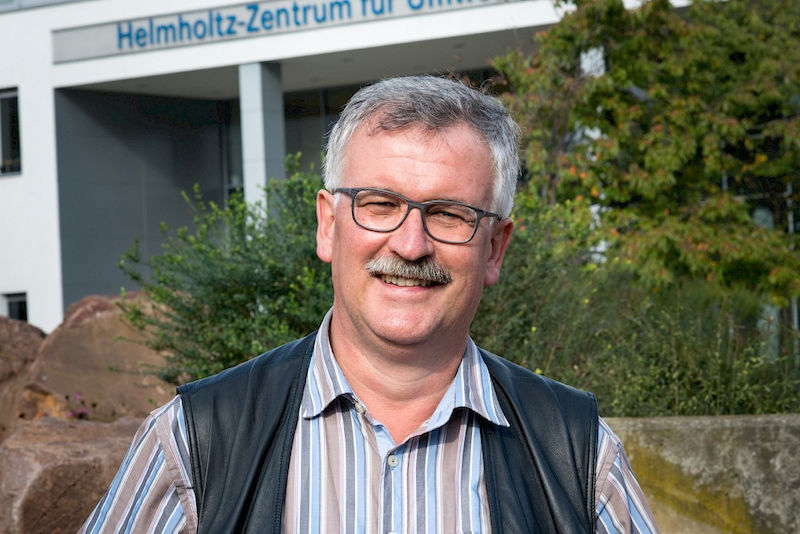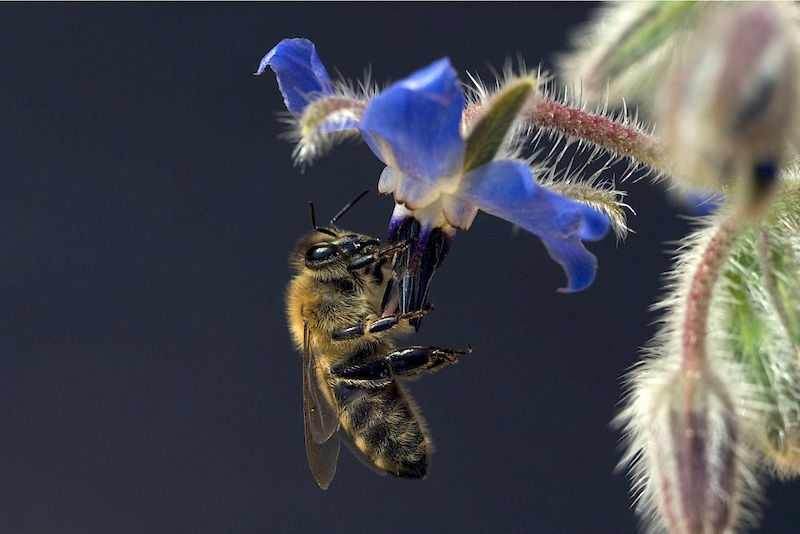World biodiversity council: Researchers from Central Germany actively involved

Professor Robert Paxton’s commitment to the protection of our biodiversity comes natural: “I love animals and plants. I don’t like the fact that they are disappearing forever.” The biologist at the University of Halle has been researching the reasons for bee extinction and its consequences for humankind and nature for many years. He says that is why he felt extremely honoured to have been nominated as an expert for the IPBES by the German government. From 2014 to 2016, Paxton was actively involved with the platform as lead author alongside his regular research work, contributing his expertise in the field of pollinators, pollination and food production.
IPBES could be compared to the world climate council IPCC, the Intergovernmental Panel on Climate Change. An international experts’ committee of researchers is currently working on a global assessment of animal and plant biodiversity and ecosystem services such as carbon storage or climate regulation.

Most scientific studies are limited to one particular location and a certain period. However, they do not provide sufficient information to allow general conclusions. The first major IPBES report, called the “Global Assessment”, intends to change this: “It is an attempt to condense the current status of the globally available knowledge into a report that is easy to understand yet also scientifically sound,” says Professor Josef Settele from the Helmholtz-Centre for Environmental Research (UFZ), where he heads the Animal Ecology and Social-Ecological Research group at the Department of Community Ecology in Halle. He is also a professor at the University of Halle.
Together with two researchers from South America, he chairs this first global assessment. They have to coordinate a team of more than 150 researchers from all over the world. The IPBES team is charged with the development of its first global assessment by 2019. IPBES also develops recommendations for policy makers on the basis of the findings in order to prevent the future loss of biodiversity. Currently, 127 countries belong to IPBES. Each country can appoint its own experts and representatives.
A Who’s Who of biodiversity research
A glance at the list of people who are actively involved in IPBES reveals: Settele and Paxton are certainly not the only researchers from Central Germany. Universities as well as non-university research institutions in Halle, Jena and Leipzig – to name only the closest cities – have supplied the IPBES with notable natural and social science experts.
Another important player is the German Centre for Integrative Biodiversity Research (iDiv) Halle-Jena-Leipzig. It was established in 2012 as a Deutsche Forschungsgemeinschaft (DFG, German Research Foundation) research centre and has since then been managed by the universities of Halle, Jena and Leipzig in cooperation with the UFZ. The Portuguese biologist Professor Henrique Pereira, a professor at the University of Halle, regularly organises working meetings for IPBES here. Over the past few years, the region has evolved into a biodiversity research hotspot. “I have recently received an increasing number of enquiries for PhD theses on these subjects from abroad,” says Professor Christine Fürst from the University of Halle. The professor for sustainable landscape development is also involved with IPBES – with a particular focus on the region of Europe and Central Asia, and the chapters on the integrated analysis of the interaction between humans and nature and on governance and decision-making options.
Research and review
The main work of the IPBES authors does not consist of classic research work in a laboratory or out in the field. Instead, they ultimately produce extremely comprehensive summary articles that are developed on the basis of specific rules. The idea is that all relevant sources published up to a certain point in time are taken on board in the reports. These also include findings and data that have not been previously published in scientific journals, for instance ministry reports but also data provided by local groups, government agencies and organisations. It takes a lot of people who are extremely familiar with the subject to review, evaluate and summarise all of these very different sources. This is where the individual researchers become involved; they develop and refine a joint action plan together.
Each chapter is reviewed, discussed and edited several times, both internally and externally. Each interim stage is meticulously documented. The strength of the reports lies in this meticulousness: Each step can be tracked, down to the tiniest detail.
Before the chapters may then be seen as expert knowledge accepted by policy makers, they have to be discussed and approved by political representatives from the member countries in plenary meetings. Robert Paxton and Josef Settele have already undergone this process: The first executive summary on the assessment report on pollinators, pollination and food production was approved in February 2016. It revealed that globally, between 16 and 40 per cent of all pollinator species are threatened with extinction. These include bees as well as other insects, bats and birds. Every year, their “free services” produce food to the value of 200 to 500 billion euros. The IPBES authors also make recommendations on how the conditions for pollinators could be improved: Farmers, for example, could plant wild flowers between their fields and use more natural pesticides.
Inspiration for their own work
The Halle-based landscape ecologist Christine Fürst’s work for the IPBES has not yet finished. She is currently addressing the question of which land use policy instruments and governance mechanisms should be developed in order to maintain biodiversity and the ecosystem services. “Ultimately, we want to describe scenarios and paths to implementing the goals of these policies, and in particular the biodiversity goals of the UN Convention on Biological Diversity,” says Fürst. In the course of this, the team has to take the sometimes very different political framework conditions in, for example, countries with a democratic constitution and countries run by dictatorship into account. The drawn-out negotiation processes in the plenary meetings can sometimes also be frustrating: “At times, everyone is haggling over half sentences, which results in numerous universal phrases. I couldn’t do that,” she says and laughs.
The work is nevertheless worth it for the researchers, also on a personal level. “I now have a much deeper, more specific understanding of research fields that border mine,” says Paxton, who hails from the UK. He says that this has raised his awareness of research gaps: “Although we know that we are losing many pollinators all over the world, there are currently precious few studies on the actual consequences this has for the pollinator services in specific regions or for specific plants.” Paxton now intends to do further research in this new field in future.
Christine Fürst adds: “At IPBES, I am working with colleagues from social science fields whom I would never have met otherwise. That is extremely inspiring!” Together with her new colleagues, she has already submitted an application for a project that focuses on the firmer integration of hydrological ecosystem services in land use planning in various European countries.
The work on the individual chapters of the global biodiversity policy platform IPBES will continue until 2019. The first final summary report on the global biodiversity and ecosystem services situation is scheduled to be completed by then. Before that, the more than 150 researchers involved, including many that are based in Central Germany, still have quite a few work packages to get through. Josef Settele from the UFZ in Halle will accompany the process until the end.
The World Biodiversity Council IPBES
IPBES stands for “Intergovernmental Science-Policy Platform on Biodiversity and Ecosystem Services”. The organisation was established in December 2010 at the United Nations General Assembly and has been based in Bonn, Germany, since 2012. IPBES views itself as an intergovernmental scientific platform that summarises objective information about the world-wide biodiversity and ecosystem services specifically for political decision-makers. The platform consists of more than 150 experts from 127 member countries. It aims to provide a comprehensive summary of the biodiversity and ecosystem services status and to develop recommendations for policy makers with regard to the measures that are necessary to maintain biodiversity on the basis of this summary.

